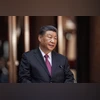The Yangtze River Delta has long been one of China’s richest regions, with fertile fishing grounds and rice paddies that have given way to a sprawling megalopolis that includes Shanghai. President Xi Jinping has been trying for years to turn the area into an even bigger economic powerhouse, hoping to create a Silicon Valley of the East.
The country’s economic slowdown, driven in part by tensions with the US and a slumping property market, is now starting to weigh on the project. Plans include an expanded high-speed rail network and a $2.6 billion artificial canal town meant to symbolise its eco-friendly ambitions. While few would dispute that the region remains a key economic driver, even Xi’s goal of creating a more efficiently-run economic bloc and high-tech arcadia hasn’t been spared the impact of the recent uncertainties.
“As the world splits into blocks, we don’t know to what extent trade would be curtailed,” said Shanghai-based independent economist Andy Xie.
The setback is particularly obvious in Lingang, a free-trade zone in Shanghai and a key part of the Yangtze Delta project. The government has offered low taxes and eased restrictions on cross-border trade in an attempt to turn the area into a high-end manufacturing and technology hub with the R&D centres and regional headquarters of multi-national firms. Today, it’s struggling to attract foreign capital and talent.
It was hoped that Tesla, which opened its new Gigafactory there in 2019, would be the first of many big-name industrial players in Lingang. But few have followed, and the biggest investors there today are mostly domestic.
US companies looking to diversify supply chains since the pandemic have accelerated their shift out of China after Washington took steps to curb the country’s access to cutting-edge technology.
More From This Section
One measure of new foreign investment in China, direct investment liabilities, fell to $4.9 billion in the April-June quarter, down 87 per cent from the same period last year and the lowest since 1998.
The impact of so-called decoupling is already being felt, said Zhang Zhongwei, deputy head of the Shanghai Municipal Development and Reform Commission.
Competing, not cooperating
Another key part of the Yangtze Delta project is improving cooperation and integration among the region’s provinces: Jiangsu, Zhejiang, Anhui, and Shanghai. The provinces have been locked in fierce competition for years, seeking to outdo each other in gross domestic product by promoting businesses within their boundaries.
Funding pressure
Local governments are also grappling with funding pressures after hefty spending on pandemic controls. This has raised concerns about another centerpiece of the Yangtze project: broadening the area’s transportation network including expressways, high-speed rail and airports.
Jiangsu and Zhejiang were among the biggest provincial spenders on Covid controls in 2022, forking out a combined $11.7 billion. Although they are still among the country’s wealthiest provinces and have managed to refinance debt, there are signs of strain.
)